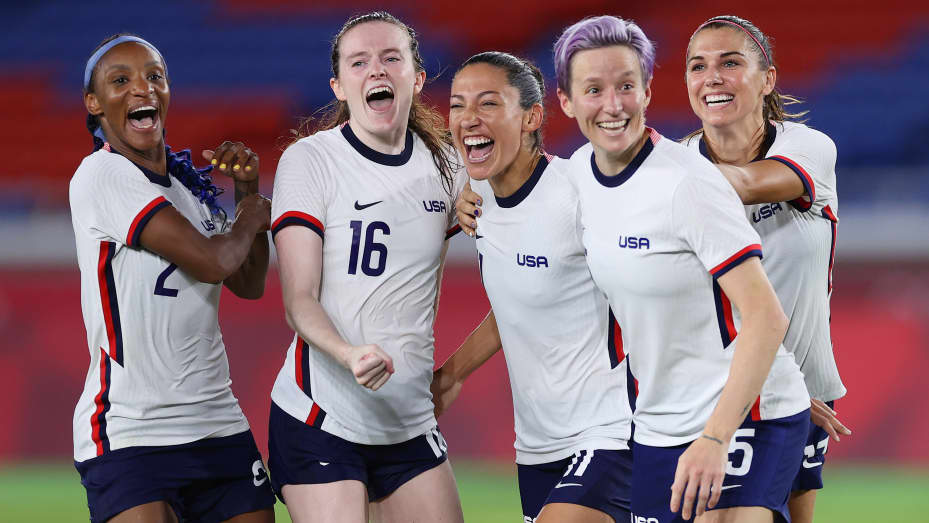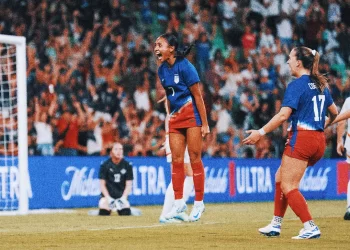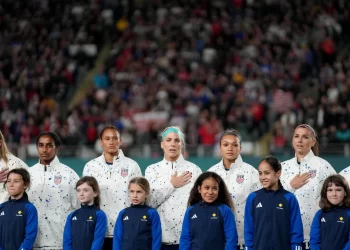By: Zachary Draves
The US Women’s National Soccer Team can officially answer the feminist slogan “have we come a long way baby?” with a resounding yes.
After three long hard fought years, the USWNT officially settled their class action equal pay lawsuit against the US Soccer Federation for $24 million.
The residual effects of this settlement are outstanding and speaks to potentially a new era not just for women’s soccer but women’s sports when it comes to the issue of pay equity.
The USWNT has long been the face of soccer in America for the last 35 years since the team was founded in 1987.
Since then, they have won four World Cups (1991, 1999, 2015, 2019) and four Olympic gold medals (1996, 2000, 2004, 2012).
They have produced some of the most iconic female athletes of all time such as Mia Hamm, Julie Foudy, Brandi Chastain, Carli Lloyd, Megan Rapinoe, and Alex Morgan.
Even with all these achievements, the players have had to engage in a longstanding battle for equal treatment and respect.
This crusade started in March 2019 when 28 USWNT players signed onto a historic gender discrimination lawsuit filed under the Equal Pay Act and Title VII of the Civil Rights Act citing inequities in pay and working conditions.
During that summer, they steamrolled past everyone to win their fourth World Cup and the rallying cry from fans both in attendance in France and back home was “Equal Pay”.
However, federal judge Gary Klausner stood in their way as he ruled against their lawsuit by saying that the women had made more money than their male counterparts on the USMNT based on the number of games that they played.
The USWNT appeal that ruling citing that they had to win more games in order to achieve any semblance of equity with the men which has been a longstanding issue among others.
In other words they have had to work twice as hard to get the same respect even as the women have generated more revenue than the men.
According to a Wall Street Journal article in 2019, the US women brought in more money over a three period from 2016-2018. https://www.wsj.com/articles/u-s-womens-soccer-games-out-earned-mens-games-11560765600.
Per the WSJ “2016, women’s games generated $1.9 million more in revenue than men’s games. From 2016 to 2018, women’s games generated approximately $50.8 million in revenue, compared with $49.9 million for men’s games.”
Under the agreements of the settlement, $22 million will be distributed to USWNT players albeit short of the $66 million they had originally asked for in their lawsuit filed back in March 2019, but nevertheless a significant figure.
In addition, the US Soccer Federation will give $2 million towards to a player’s retirement fund and to programs to help grow the sport.
Furthermore, the USSF are committing to equal pay for both the women’s and men’s teams in all friendly and tournament matches including the World Cup.
This victory has been heralded by the women’s sports world as a monumental step forward for gender equality.
Nicole M. LaVoi, Director of the Tucker Center for Research on Women and Girls in Sports at the University of Minnesota, foresees this in a broader societal context.
“The pending settlement for the USWNT is one step in the right direction to correct for decades of inequity” she said.
“Time will tell how it will impact women’s sport, but I am hopeful it will help push the needle forward for pay equity for the same job (for women who by the way perform better) for all women.”
After all these years of performing on the field while simultaneously being undermined off the field, the USWNT can take a breath of fresh air after yet another victorious hard fought battle.
While there is much more that needs to be done to ensure that female athletes are given financial and ethical equity across the board, any step forward is worth celebrating.
One small step for woman, one giant leap for womankind.


 NFL
NFL





